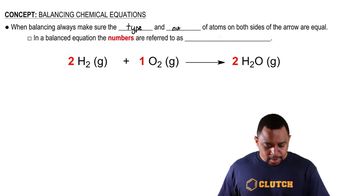Here are the essential concepts you must grasp in order to answer the question correctly.
Solubility Product Constant (Ksp)
The solubility product constant (Ksp) is an equilibrium constant that quantifies the solubility of a sparingly soluble ionic compound. It is defined as the product of the molar concentrations of the ions, each raised to the power of their coefficients in the balanced dissolution equation. Ksp values are specific to temperature and provide insight into the extent to which a compound can dissolve in water.
Recommended video:
Solubility Product Constant
Dissolution of Ionic Compounds
The dissolution of ionic compounds involves the separation of the compound into its constituent ions when it is added to a solvent, typically water. For example, when lead(II) bromide (PbBr2) dissolves, it dissociates into lead ions (Pb²⁺) and bromide ions (Br⁻). This process is represented by a balanced chemical equation that reflects the stoichiometry of the ions produced.
Recommended video:
Balanced Chemical Equations
A balanced chemical equation represents a chemical reaction with equal numbers of each type of atom on both sides of the equation. Balancing is essential to comply with the law of conservation of mass. In the context of Ksp, the balanced equation for the dissolution of an ionic compound is crucial for accurately determining the Ksp expression, as it dictates the concentrations of the ions involved.
Recommended video:
Balancing Chemical Equations
 Verified step by step guidance
Verified step by step guidance


